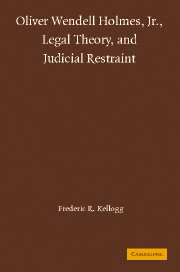Book contents
- Frontmatter
- Contents
- Preface
- 1 A Time for Law
- 2 Playing King: Connections and Misconceptions
- 3 Holmes's Conception of Law
- 4 Common Law Theory Revisited
- 5 Holmes and Legal Classification
- 6 The General Theory of Liability
- 7 Morals and Skepticism in Law
- 8 Judges, Principles, and Policy
- 9 Common Law Constitutionalism
- 10 Holmes's Theory in Retrospect
- 11 Conclusion
- Appendix
- Bibliography
- Index
9 - Common Law Constitutionalism
Published online by Cambridge University Press: 24 July 2009
- Frontmatter
- Contents
- Preface
- 1 A Time for Law
- 2 Playing King: Connections and Misconceptions
- 3 Holmes's Conception of Law
- 4 Common Law Theory Revisited
- 5 Holmes and Legal Classification
- 6 The General Theory of Liability
- 7 Morals and Skepticism in Law
- 8 Judges, Principles, and Policy
- 9 Common Law Constitutionalism
- 10 Holmes's Theory in Retrospect
- 11 Conclusion
- Appendix
- Bibliography
- Index
Summary
All rights tend to declare themselves absolute to their logical extreme. Yet all in fact are limited by the neighborhood of principles of policy which are other than those on which the particular right is founded, and which become strong enough to hold their own when a certain point is reached.
O. W. Holmes, Hudson County Water Co. v. McCarter (1908)In 1901, when the assassination of President McKinley elevated Theodore Roosevelt to the presidency, Holmes had for three years been Chief Justice of the Supreme Judicial Court of Massachusetts. Having sat on that court for two decades, he was now sixty-one, pushing the limit of eligibility for a Supreme Court appointment. Though Justice Horace Gray was ill and expected to resign, creating an opening for another Massachusetts man (a remarkable priority in the politics of the nation), McKinley had promised the appointment to a prominent Boston lawyer, Albert Hemenway. With the President's sudden death, social and family ties came to bear in Holmes's favor. An old Roosevelt friend, Massachusetts Senator Henry Cabot Lodge, intervened on the side of the judge whom he had known from childhood, and made him the leading and ultimately successful candidate.
For almost any other Republican the controversial dissents in the labor cases would have disqualified him. He had written them despite his own doubts about the labor cause, following a theory that, if we take him at his word, effectively removed his political and economic sympathies. Unaware of that, the President wrote Lodge:
The labor decisions which have been criticized by some of the big railroad men and other members of large corporations contribute to my mind a strong point in Judge Holmes' favor. […]
- Type
- Chapter
- Information
- Oliver Wendell Holmes, Jr., Legal Theory, and Judicial Restraint , pp. 137 - 156Publisher: Cambridge University PressPrint publication year: 2006



